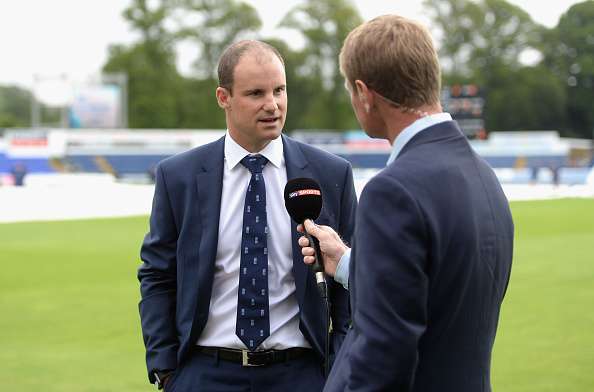Peter Hayter notes how the Wisden launch last year became a watershed moment for England’s international cricketing fortunes
The annual dinner to launch the publication of Wisden this week marked the anniversary of the sacking of Paul Downton and the moment Andrew Strauss replied to my enquiry over whether he would be interested in the newly vacant job of Director of England Cricket with a flat: “No.”
The morning afterwards marked the anniversary of the moment he texted to explain that he had been caught unawares the previous evening when I had collared him in the pavilion at Lord’s, that he was “as surprised as anyone when the news broke” and that it would be “completely wrong to rule myself out without seeing what they had in mind for the new role”.
A year on, supporters of the England team who won back the Ashes, beat South Africa in South Africa, finally found itself dragged into the 21st century in ODI cricket and came within one over of winning the World T20, are grateful Strauss allowed himself a night to sleep on things.
At the time the former England skipper took over, everywhere you looked grim chaos reigned.
Emotions were running so high that even in the normally august atmosphere of the black-tie launch of the Cricketers’ Almanack, it kicked off big-time.
The claim of Lawrence Booth in his Notes By The Editor that: “2014 was the year English cricket repeatedly lost touch …with the basic idea that the national team belongs to us all,” so inflamed the outgoing ECB chairman Giles Clarke that, following coffee and petits fours, and to the astonishment of onlookers clutching their yellow ‘bibles’, the two men engaged in what is known as a “heated exchange”.
It was little wonder.
The World Cup in Australia and New Zealand had been a more or less unmitigated disaster, starting with the too-late discarding of Alastair Cook as ODI captain, England’s approach rooted in the past and seemingly weighed down by the apparently stats-obsessed approach of coach Peter Moores.
When it ended, after crushing defeats by Australia, New Zealand and Sri Lanka, with a car crash against Bangladesh, the nation shrugged its utter lack of surprise.
The Test side had failed to put away a West Indies outfit, stripped of their stars by their continuing disputes with their own Board and described by incoming ECB chairman Colin Graves as “mediocre”, losing the third Test in Barbados by five wickets in front of travelling England supporters who had barely recovered from their chastening experiences Down Under and whose boos reflected the depth of their disaffection. Captain Cook, looking increasingly like a man worn down by the captaincy, was considering his future.
And even after Strauss was preferred to Michael Vaughan for the job of sorting out the mess, an early but spectacular own goal from Graves, when he offered Kevin Pietersen a way back into the England side as long as he found himself a county to play for, looked like being a matchwinner for KP’s supporters while he was cruising towards an unbeaten triple-century for Surrey against Leicestershire.
Yet, as Strauss contemplates the start of his second year in the job, while realistic enough to know how quickly things can change for the worse, he is now able to reflect on how quickly they have gone right.
Strauss’ first job was to clarify the position over Pietersen and he did. Pietersen would not be considered for the upcoming Ashes.
He did muddy the waters unnecessarily by stating that he would welcome Pietersen’s input on an informal basis, but that was the politician in him following the rule about keeping your friends close and your enemies closer and no-one believed it for an instant, especially not KP himself.
Next, he needed to back or sack his skippers – the under-fire Cook in Test cricket and the even more under-fire Morgan in the white-ball stuff.
While his support was not unqualified (none of us knows what the future holds etc.) it was strong enough to remove any immediate uncertainty and Cook has since said that, by making it clear the decision over Pietersen was his, Strauss took him out of the firing line he had been stuck in since the batsman’s sacking following the 2013-14 Ashes whitewash, thus allowing him to concentrate on looking forward rather than over his shoulder.
Then, while supporting the decision to sack Moores, the soundings Strauss had taken told him of the players high regard for his No.2 Paul Farbrace and, resisting the temptation to go for the popular choice of Jason Gillespie, he appointed Trevor Bayliss as coach on the basis that his quiet, non-demonstrative but supportive approach was far more in line with the positive atmosphere he knew must be created, that and the hard evidence of the Australian’s track record in partnership with Farbrace.
As for the players, Strauss made it clear he was looking for characters prepared to take responsibility for their own performances (echoing the content of the message he hammered out to them at the start of the Andocracy with Andy Flower, which laid the foundations for their 2009 Ashes win) and for players to play for England as though they were enjoying it.
But even he admitted to being taken aback when they pulled off a stunning win over New Zealand in the first Test of the summer at Lord’s, thanks mainly to the performance of Ben Stokes who, promoted to No.6, did both of the above as he made 92 in the first innings and 101 from 92 balls then took three second innings wickets to secure victory.
And while they landed with a bump in the second at Headingley, excitement levels were back at fever pitch when a side containing only two players who had played against Sri Lanka a year previously hit 408 against the Kiwis in the first ODI at Edgbaston and went on to win the series against the losing 2015 World Cup finalists .
Strauss, attempting to dampen down expectations, called that record-breaking total a perfect storm. It has been raging, sometimes imperfectly, but always entertainingly, ever since.
Most observers were agreed that England had little chance of winning the Ashes and Strauss risked out-and-out scorn when he took a 14-man squad to Spain before the start of the series for a bonding trip – how the Aussies tucked into the story of the Poms putting their feet up by the pool in advance of the humiliation that must inevitably follow.
But by the time the urn was safely in Cook’s hands, thanks to Stuart Broad’s devastating spell at Trent Bridge, the moments the players spent signing autographs and posing for selfies with the crowd celebrating an unassailable 3-1 lead showed that the reconnection with the public Strauss had identified as crucial was complete.
When he decided to take on the job Strauss appreciated from the outset he would need plenty of luck and, if things went badly, there were many lining him up for both barrels.
Perhaps that was one of the reasons he invited former England stars like Bob Willis and Sir Ian Botham into the dressing room to engage with players of whose efforts some had had occasion to criticise.
And why he was happy to act as go between to instigate private chats between Cook and Ashes winner Michael Vaughan, who in another world may have been preferred to Strauss for the job in the first place.
Strauss claimed it was part of his mission to bring all branches of the England cricket family closer together and give the current players a feeling of being part of history.
Either way, both sides felt it removed an invisible barrier to mutual understanding.
Strauss knows English cricket still faces major issues as it tries to find a place for itself in the national sporting consciousness, but, if his second year in the job turns out to be anything like the first, just how bad things were 12 months ago will seem nothing but ancient history.
This piece originally featured in The Cricket Paper, Friday April 15 2016















